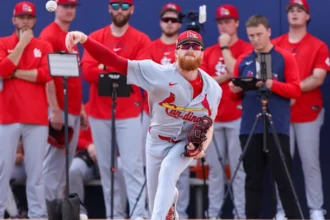It’s rare to find oneself arguing that the team leading the league is underrated, but that’s the current scenario with the New York Rangers.

Despite holding the best record in the National Hockey League with 112 points over 81 games this season, there’s a prevailing sentiment in both national media and among fans that they aren’t serious contenders for the Stanley Cup. Typically, when a team is in contention for the top spot, there’s discussion about their potential to win it all.
However, this season, there’s skepticism surrounding the Rangers, with some labeling them as an anomaly rather than acknowledging their potential to secure their first division title and Presidents’ Trophy since 2015.
Rangers under appreciated Cup contender
Many are concerned about the Rangers’ ability to generate offense at 5-on-5, relying heavily on their power play for scoring opportunities. This critique echoes sentiments from the 2021-22 season when a similar situation unfolded, with the team reaching the brink of the Stanley Cup Final despite most players being playoff newcomers.
Contrary to the belief that playoff success hinges solely on 5-on-5 performance, recent statistics show an increase in penalties during playoff games compared to the regular season. This trend benefited teams like the Colorado Avalanche and Rangers in 2021-22, both excelling in power play efficiency and making deep playoff runs.
In an ESPN article, experts highlight the Rangers’ 5-on-5 struggles as a barrier to their Stanley Cup prospects, also noting formidable opponents like the Carolina Hurricanes. However, the suggestion that the Cup journey must pass through traditional powerhouses like San Jose, Chicago, or Columbus seems outdated. Instead of dwelling on negativity, let’s consider three reasons why the Rangers could hoist the Stanley Cup this season.
3 reasons why the New York Rangers can win the Stanley Cup
Goaltending
It’s hardly surprising that a team consistently fielding Igor Shesterkin two to three times weekly would find themselves near the pinnacle of goaltending in the league. Though Shesterkin faced challenges in December and January, he’s managed to overcome them in the past two and a half months. Since February 1st, Shesterkin leads the NHL in save percentage while enduring the fifth-highest shot count among goaltenders.
Top-tier goaltending is essential for a Stanley Cup victory, and the Rangers undeniably possess it. Jonathan Quick bolsters their goaltending depth, crucial in worst-case scenarios. Quick ranks 12th in the NHL for save percentage this season, tying Shesterkin in that metric (minimum 20 games started). Additionally, Quick brings invaluable experience, having won two Stanley Cups as a starting goaltender (three in his career).
Since the 2018-19 season, nearly all Stanley Cup champions have succeeded without being top-10 teams in defensive play. Currently, the Rangers rank 7th in the league for goals against per game (2.79), indicating a strong defensive performance.
Special Teams
The Rangers prioritize their power play, which has been consistently strong in recent seasons, ranking among the league’s top performers. Currently, they stand second in the NHL with a 26.8% success rate, trailing only the Tampa Bay Lightning.
While a potent power play isn’t a necessity for winning the Stanley Cup, recent trends suggest its importance in playoff success. Teams like the Lightning and the Colorado Avalanche, champions in recent years, have showcased formidable power plays during their playoff runs.
However, the Rangers’ special teams prowess extends beyond just their power play. They also excel in penalty killing, ranking third in the league. This ability to nullify opponents’ advantages can significantly shift momentum in games, especially crucial in playoff scenarios.
Coaching
This statement suggests that the current success of the New York Rangers under coach Peter Laviolette is significant. Laviolette’s track record of winning and his influence on the team’s culture are highlighted, contrasting with previous coaching experiences.
The team’s improved performance is evident, with players like Alexis Lafreniere and Vincent Trocheck excelling, and younger defensemen like Zac Jones and Braden Schneider showing growth.
Despite the team’s potential, there’s a sense of frustration among fans due to media and public perception. Ultimately, the playoffs will determine the Rangers’ fate, emphasizing that predictions and opinions are secondary to the players’ and coaches’ performances on the ice.





